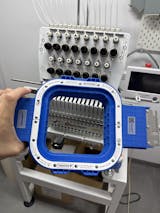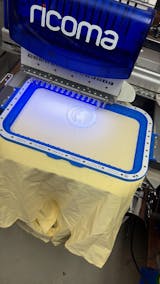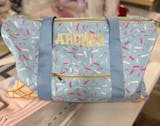1. Introduction: Navigating Janome Multi-Needle Machine Selection
Choosing the right multi-needle embroidery machine can feel like a maze of features and specs. Whether you run a studio with a janome embroidery machine, love hobby stitching, or are stepping into professional work, your machine drives your workflow. This guide compares Janome’s MB-4S and MB-7, unpacks speed and hoop sizes, and shares workflow and maintenance insights so you can pick a model that matches your creative and business goals.
Table of Contents
- 1. Introduction: Navigating Janome Multi-Needle Machine Selection
- 2. Janome MB-4S vs. MB-7: Model Comparison for Commercial Needs
- 3. Technical Deep Dive: Speed, Hoops & Multi-Color Efficiency
- 4. Maintenance Mastery: Ensuring Long-Term Reliability
- 5. Workflow Optimization Strategies
- 6. Janome vs. Brother PR Series: Commercial Viability Showdown
- 7. Conclusion: Matching Machine to Business Goals
- 8. FAQ: Janome Multi-Needle Machine Essentials
2. Janome MB-4S vs. MB-7: Model Comparison for Commercial Needs
When you’re investing in a multi-needle embroidery machine in the $4,000–$6,000 range, the MB-4S and MB-7 are standout options. Here’s how they differ for commercial needs.
2.1 Core Specifications Breakdown
The MB-4S and MB-7 serve different production scales. Compare them side by side:
| Feature | Janome MB-4S | Janome MB-7 |
|---|---|---|
| Needles | 4 | 7 |
| Thread Changes | Frequent (4 colors at once) | Minimal (7 colors at once) |
| Speed | 600–800 SPM | 800 SPM |
| Embroidery Field | 9.46" x 7.88" | 9.46" x 7.88" (Tajima-standard) |
| Built-in Designs | 50 | 50 |
| Monogram Fonts | 10 | 10 |
| Screen | Basic | 5.7" Remote Computer Screen |
| Price Range | Lower (varies) | $4,000–$5,000 |
Why does needle count matter? The MB-7’s seven-needle system lets you preload up to seven thread colors, reducing thread changes by as much as 75% compared to the MB-4S. For bulk orders or intricate, multi-color work, that means less downtime and more output.
Embroidery area and speed: Both provide a 9.46" x 7.88" field for jackets, banners, and large motifs. The MB-7 runs a consistent 800 SPM, while the MB-4S ranges from 600–800 SPM, making the MB-7 a better fit for high-volume, time-sensitive jobs.
Tech and usability: The MB-7’s 5.7" Remote Computer Screen (RCS) adds on-screen editing, previews, and easier control, especially when you manage multiple machines. The MB-4S is robust but lacks those advanced screen tools.
2.2 ROI Analysis: When to Choose Each Model
Real-world scenarios make the differences clear:
| Scenario | Recommended Model | Rationale |
|---|---|---|
| High-volume production | MB-7 | 7 needles minimize downtime; compatible with Tajima hoops for large designs. |
| Mobile workshops | MB-7 | Compact (43 lbs) and portable for tight spaces. |
| Basic embroidery | MB-4S | Lower upfront cost; ideal for single-color or low-complexity projects. |
User feedback from the field:
- MB-7 owners highlight efficiency in commercial settings, fewer manual thread changes, and a pro finish on complex jobs. Its Tajima hoop compatibility and robust build make it a favorite for growing studios.
- MB-4S users value reliability across fabrics, though frequent thread changes can slow multi-color runs.
Cost-benefit perspective: Both are strong investments. The MB-7’s needle count and advanced features trim labor costs and speed turnaround, critical for scaling. The MB-4S is a smart entry point for simpler needs.
Bottom line: If you demand speed, scalability, and professional results, choose the MB-7 within a $5,000–$6,000 budget. For small studios or hobbyists, the MB-4S is cost-effective without overcommitting.
3. Technical Deep Dive: Speed, Hoops & Multi-Color Efficiency
Janome’s multi-needle machines are built for performance. Here’s how their specs translate into day-to-day results.
3.1 Understanding 800 SPM Performance in Real Workflows
- High-speed stitching: At up to 800 SPM, both models tackle large, complex designs efficiently—ideal for commercial environments.
- Stitch density vs. speed: Maximum speed excels on simple designs; slowing down can improve dense or intricate stitch-outs and delicate fabrics.
- Jumbo bobbins: Both use jumbo bobbins holding 1.4x more thread than standard ones, meaning longer runs with fewer interruptions.
3.2 Hoop Compatibility & Fabric Handling Solutions
Hoop flexibility is essential. Both models include four standard hoop sizes for garments and accessories:
| Hoop Size (Inches) | Use Case |
|---|---|
| 9.46" x 7.88" | Jackets, banners, large motifs |
| 5" x 4.3" | T-shirts, tote bags |
| 2" x 2" | Patches, small logos |
| 1.9" x 1.9" | Caps, small accessories |
Stabilization techniques: Use quality stabilizers and even hooping to keep fabric taut at higher speeds.
Magnetic hooping innovation: For an even firmer grip—especially during high-speed runs—magnetic embroidery hoops for janome offer a game-changing solution. Sewtalent magnetic hoops hold fabric securely, adapt to thickness, and help reduce slippage or hoop burn for faster setup, less waste, and consistent quality.
Ready to level up your shop? Pair the MB-7 with Sewtalent magnetic hoops to boost productivity and quality. Stitch faster—and smarter.
4. Maintenance Mastery: Ensuring Long-Term Reliability
Treat your multi-needle machine like the workhorse it is. Regular care keeps the MB-4S or MB-7 stitching smoothly for years.
4.1 Daily/Weekly Maintenance Checklists
Think of maintenance as insurance: a few minutes a day saves hours later.
Daily Maintenance
- Oiling the Hook Race: Every 4 hours of heavy use—or after each bobbin change—apply 1–2 drops of machine oil to the hook race. Turn the handwheel slowly to distribute oil.
- Cleaning: Brush lint from the hook race and tension disks, focusing on the bobbin area to prevent thread breaks and tension issues.
Weekly Maintenance
- Needle Inspection: Replace needles every 2–4 million stitches, or sooner if breaks occur. Choose 75/11 or 90/14 by fabric thickness.
- Tension Disk Checks: Inspect and clean for debris; ensure proper adjustment.
Fortnightly Maintenance
- Lubricate Moving Parts: Oil needle bars and other moving components per the manual.
Real-world tech support insight: For error codes like E7, power off for 30 seconds, clear visible threads from the hook race/bobbin, and check for hidden jams behind the hook’s central axis. Floss between top tension disks with clean fabric (a touch of alcohol helps) to remove stubborn lint.
Pro Tip: Keep your manual handy for diagrams and error code references.
Long-Term Durability Habits
- Cover the machine when not in use.
- Use quality thread to reduce wear.
- Follow Janome’s maintenance schedules for oiling, cleaning, and parts.
4.2 Troubleshooting Common Thread Tension Issues
Even pros face tension problems; most are easy to diagnose.
Visual Guide to Tension Adjustments
| Symptom | Likely Cause | Solution |
|---|---|---|
| Bobbin thread visible on fabric top | Top thread tension too tight | Loosen by turning the tension dial counterclockwise |
| Loopy top thread | Top thread tension too loose | Tighten by turning the tension dial clockwise |
| Thread kinks or snags | Pre-tension dial misadjusted | Slightly turn the pre-tension dial clockwise |
Bobbin Tension Adjustment
- To tighten: Turn the bobbin case adjusting screw clockwise.
- To loosen: Turn it counterclockwise—make tiny moves.
Case study: Persistent looping and jams after a needle #2 jam were resolved by flossing lint from top tension disks, clearing hidden jams in the hook/bobbin area, and verifying needle position.
If in doubt, consult your manual or reach out to your local dealer—especially under warranty.
Pro Tip: Make small tension changes and test on scrap before production.
5. Workflow Optimization Strategies
Efficiency matters. Janome’s features, paired with smart accessories, streamline production.
5.1 Leveraging RCS Controls & Auto-Thread Cutting
Remote Computer Screen (RCS): Your command center
- Design Sequencing: Queue multiple jobs, view estimated times, and color orders to batch efficiently.
- On-Screen Editing: Resize, rotate, flip, and combine designs directly on the RCS.
- Automatic Thread Cutting: Trims between color changes/segments for cleaner finishes and less manual snipping.
How hooping supports automation
- Quick, consistent hooping: janome magnetic embroidery hoops help maintain even tension across materials and reduce setup time.
- Reduced downtime: Fewer hooping errors mean you fully benefit from automation.
- Batch-ready: Pair fast hooping with memory/sequencing to press start and let the machine run.
A reviewer noted that a magnetic hoop made hooping “a lot more simple,” especially on tricky materials—perfect alongside auto-thread cutting and RCS.
5.2 File Management Best Practices (.JEF/.DST)
Janome Digitizer MB Pro supports .jef, .jef+, and .dst formats for smooth integration.
Optimizing memory for batch processing
- MB-4S: 3MB internal memory stores roughly 15–20 complex designs; reserve space for monograms, templates, and backups.
- MB-7: Use priority stacking to push urgent projects first.
Best practices
- Pre-load designs before a run.
- Organize by client/design type with clear naming.
- Monitor storage; delete old files regularly.
- Use supported formats (.jef, .jef+, .dst) to minimize import errors.
6. Janome vs. Brother PR Series: Commercial Viability Showdown
For speed, reliability, and multi-color efficiency, the right machine is pivotal.
6.1 Needle Count vs. Speed: Production Capacity Compared
| Feature | Janome MB-7 | Janome MB-4S | Brother PRS100 |
|---|---|---|---|
| Needles | 7 | 4 | 1 |
| Max Speed (SPM) | 800 | 800 | 1,000 |
| Embroidery Area | 9.46" x 7.88" | 9.46" x 7.88" | 8" x 8" |
| Stitch Storage | 200,000 | 200,000 | 500,000 |
| Thread Changes | Minimal | Moderate | Frequent |
| Price | $9,999 | Not listed | Lower than Janome |
What it means: The MB-7’s seven-needle setup slashes manual thread changes and lifts output on multi-color designs. Single-needle machines can be fast on simple jobs, but constant retreading adds downtime on complex work.
Bottom line: For high-volume, multi-color embroidery, the MB-7’s multi-needle system is a commercial difference-maker.
6.2 Upgrade Paths for Growing Businesses
Thinking long-term? Scalability matters. The MB-7 supports .jef+, .jef, and .dst formats and USB imports, and its compatibility with janome embroidery machine hoops and Tajima standards opens access to a wide range of commercial add-ons.
Planning for growth? janome hoops and Tajima standards keep accessory choices broad, while Sewtalent magnetic hoops are engineered for wide compatibility across many commercial machines.
Strategic takeaway:
- Commercial users: Prioritize MB-7 for multi-color efficiency, durability, and accessory compatibility.
- Budget-conscious startups: The Brother PRS100 is a lower-cost entry for simple, single-color work.
- Growth-minded studios: Choose scalable solutions that won’t constrain future expansion.
7. Conclusion: Matching Machine to Business Goals
Selecting a Janome multi-needle machine is a strategic decision shaped by volume, design complexity, and budget. For high-volume, multi-color projects, the MB-7—with seven needles, a generous field, and advanced RCS controls—stands out as a commercial powerhouse. Pairing it with a janome magnetic hoop and Sewtalent magnetic hoops streamlines hooping, ensures even tension, and reduces costly errors.
If you’re testing the multi-needle waters or running smaller batches, the MB-4S offers reliable performance at a friendlier price. Choose the model that aligns with your goals, optimize your workflow, and watch your business scale—one perfectly stitched project at a time.
8. FAQ: Janome Multi-Needle Machine Essentials
8.1 Q: Can the Janome MB-4 do hats?
A: No. The Janome MB-4 does not support hat embroidery out of the box. Its hooping system targets flat and tubular garments. If caps are essential, consider machines with dedicated cap frames or the MB-7 for broader hoop compatibility.
8.2 Q: What’s the ideal first multi-needle machine for small studios?
A: The MB-4S suits studios producing fewer than 50 units per week. It offers four needles, a large embroidery area, and approachable controls—reliable for beginners and small runs.
8.3 Q: What software do I need for Janome multi-needle machines?
A: Janome’s Digitizer MB Pro covers editing and conversion for .jef and .dst, including resizing, rotating, and customization for smooth integration with the MB-4S or MB-7.




